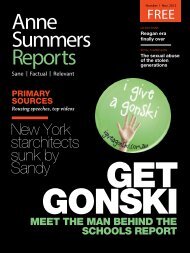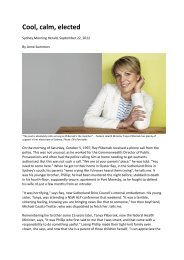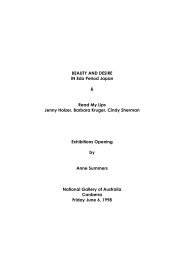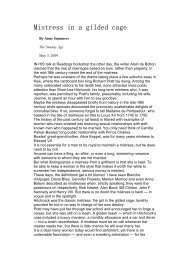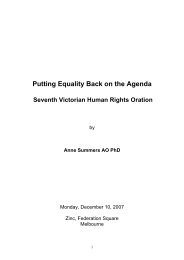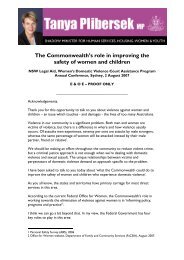A desperate housewife took a stand
A desperate housewife took a stand
A desperate housewife took a stand
You also want an ePaper? Increase the reach of your titles
YUMPU automatically turns print PDFs into web optimized ePapers that Google loves.
A <strong>desperate</strong> <strong>housewife</strong> <strong>took</strong> a <strong>stand</strong><br />
Sydney Morning Herald<br />
February 6, 2006<br />
Betty Friedan led the charge for equality but also predicted a backlash against it,<br />
writes Anne Summers.<br />
At a small dinner in Sydney in the mid-1990s, the celebrated writer and feminist Betty<br />
Friedan, who died on Saturday, her 85th birthday, was asked how she characterised<br />
herself. She did not hesitate: "First, I am an American. Second, a Jew and thirdly, I am a<br />
woman."<br />
It was a remarkable repositioning of self-perception and priorities from the woman whose<br />
book The Feminine Mystique in 1963 changed the lives of millions of women around the<br />
world, but by then she had been largely spurned by the movement she helped found and<br />
had decided, or been forced, to move onto other issues.<br />
The Feminine Mystique was the book that "pulled the trigger on history", according to<br />
Future Shock author Alvin Toffler. It was the book that lifted the veil on the misery of the<br />
legions of educated middle-class housewives in affluent mid-20th-century America<br />
whose failure to find fulfilment from shopping, cooking, chauffeuring, running a perfect<br />
house and trying to be a faultless wife made them feel guilty and depressed. It was,<br />
Friedan wrote, "the problem that has no name", so she set out to identify, document and<br />
name it. Her book sent shock waves around America and then much of the Western<br />
world. The perfect 1950s <strong>housewife</strong>, who is parodied with deadly accuracy by the<br />
character Bree van de Kamp in Desperate Housewives, was a seething mass of discontent<br />
who was, it turned out, more than ready to join the throngs storming the sexual barricades<br />
to form the second-wave feminist movement.<br />
Friedan was always a political pragmatist who believed that equality issues such as job<br />
opportunities and remuneration and political representation were more relevant to<br />
women's lives than the cultural issues preferred by many more radical women. In 1966<br />
she co-founded the National Organisation for Women (NOW), a women's rights lobby<br />
group, now 500,000 strong, which fought to end innumerable discriminatory practices.<br />
But she also had to overcome other obstacles. There was that day in February 1969 when<br />
Friedan was due to lead a protest against the infamous barring of women from the Oak<br />
Room in New York's celebrated Plaza Hotel between noon and three each day, the time<br />
when business was then done. She called in to say she couldn't make it; she had a black<br />
eye and bruises all over her face, she told her aghast sisters. Her husband had given her a<br />
walloping - something she said he often did when she was due to face the media. A<br />
make-up artist covered the injuries, Friedan wore dark glasses, and the protest went
ahead. The Oak Room eventually allowed women to lunch in its hallowed sanctum. And<br />
Friedan divorced her husband.<br />
Friedan became increasingly controversial within the women's movement. In 1969 she<br />
caused outrage for denouncing what she called "the lavender menace", the increasing<br />
number of lesbians within the movement who, she said, would alienate straight women.<br />
She stepped down as NOW president in 1970 but continued to be a forceful voice for<br />
equality. In 1981 she published The Second Stage, her blueprint for how women and men<br />
could live together in an equal world. But leaders like Gloria Steinem, with whom she<br />
maintained a celebrated and acrimonious feud, froze her out of the feminist mainstream.<br />
Friedan, a dumpy and raw-featured woman, was never a match for Steinem, whose<br />
sinewy glamour and catchy turn of phrase made her a media favourite. Nor did Friedan's<br />
famously brusque and peremptory manner make her an easy ally. Increasingly, she<br />
moved away from women's issues and in the 1990s when she visited Sydney as a guest of<br />
the state government, it was to talk about her new issue, getting older, and her engaging<br />
book on the subject, The Fountain of Age.<br />
Friedan famously warned of a backlash against women's equality and, as with so many of<br />
her pronouncements, she has proved to be chillingly prescient. The New York Times<br />
columnist Maureen Dowd asks in her newly released Are Men Necessary?: "If we flash<br />
forward to 2030, will we see all those young women who thought trying to Have It All<br />
was a pointless slog, now middle-aged and stranded in suburbia, popping Ativan,<br />
struggling with rebellious teenagers, deserted by husbands for younger babes, unable to<br />
get back into a workforce they never tried to be part of?"<br />
If this happens, says Dowd, these domestic robots will be "<strong>desperate</strong>ly seeking a new<br />
Betty Friedan".<br />
The old one would be appalled.<br />
http://www.annesummers.com.au<br />
Anne Summers, a former head of the Office of Status of Women, wrote the<br />
influential Australian feminist history Damned Whores and God's Police.



